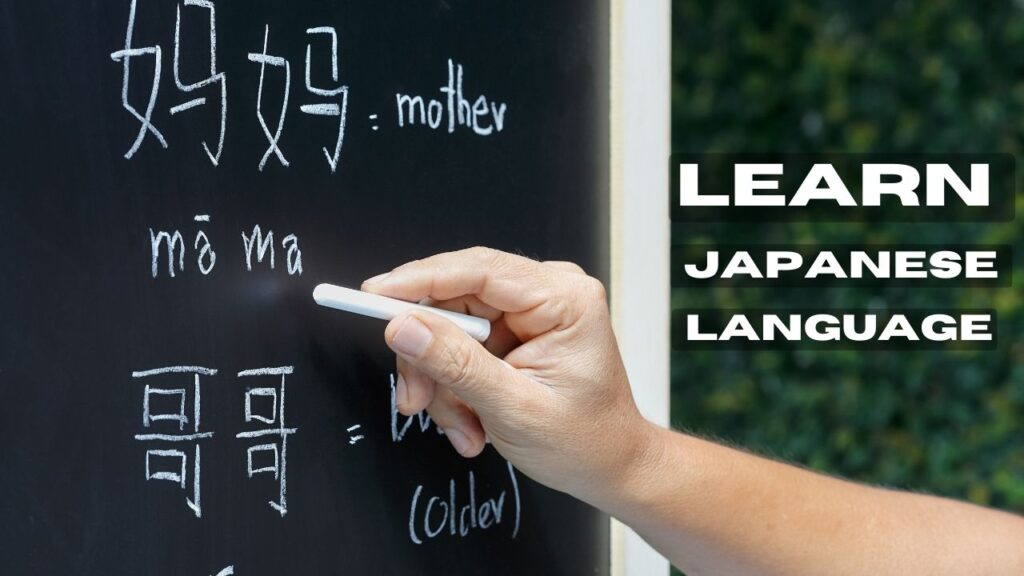How To Learn Japanese Language faster: Shortcuts and Effective learning strategies

Before learning a language, you need to know why you want to learn the Language. How important is this Language to you? Your positive answers to these questions will increase your interest in learning. Learning any language is not easy, and even more difficult if it is Japanese. Japanese is one of the most challenging languages in the world. Learning anything is very easy if people have willpower and reasonable guidelines. In this article, we will discuss how to learn Japanese very easily, quickly and effectively.
Introduction to Japanese characters
One of the initial challenges in learning the Japanese language is understanding its unique characters.There are three distinct types of Japanese characters, each with its own significance and role in the language.
- HiraGana: HiraGana is an essential character in the Japanese language.
- Katakana: Katakana are the words that came from English to Japan;People use Katakana to write those words.
- Kanji: Kanji is a Chinese character, the characters that came to the Japanese language. Kanji is the hardest part of learning Japanese.
The question may come to your mind: Which one will we learn first? Of course, you will learn HiraGana first. Katakana is very simple because it comes from English. If HiraGana is good, Katakana automatically becomes good. For example, in English, capital letters and small letters have the same pronunciation but look different. Just like the pronunciation of HiraGana Katakana is the same, the appearance is different. Kanji is the most difficult, but Some techniques can help you master it very well.
Some shortcut methods and techniques
- Self-Study: There is no alternative to studying through effort and dedication to succeed in any work or activity. This method often involves using textbooks, online resources, and language-learning apps to acquire new vocabulary, grammar, etc.
- Language schools and classes: The JUAAB Japanese Language school is a hub of diverse Japanese learning programs catering to many learners. Online tutorials are also available on social media, and the Ministry of Foreign Affairs frequently launches various language learning programs.
- Language Exchange opportunities: The language exchange program is user-friendly and a medium for talking with people from other cultures. You can find it online in mega events or hosted nationally and internationally.
Japanese Language Reports:
- Number of Speakers: Japan is widely used in the Japanese territory, serving as the state language. As of Worlddata.info’s latest reports in 2024, the number of total Japanese speakers around the globe is more than 125 million.
- Growth of Japanese Language Programs: The Japan Foundation’s statistics reveal a notable expansion of Japanese language programs, now present in 141 countries. This growth is further evidenced by the 18,272 institutions currently offering Japanese language courses, with 63.1% of these conducted online.
- Language Difficulty: According to Effective Language Learning’s latest language difficulty ranking, Japan is a Category-5 Language, which means that it is one of the hardest languages to master. The minimum learning period for Japanese from zero level is 2200 hours.
Essential Resources for Learning Japanese:

Textbooks: Books are the best resource for mastering any subject. Learning by reading books is our natural habit; there are many kinds of books available to buy for learning the Japanese language.
Online Platforms: Numerous platforms are available throughout the internet, such as Duolingo, Memrise, and Rosetta Stone. These platforms offer interactive lessons, vocabulary drills, and head-to-head conversations.
Language Learning Apps: Mobile apps like “JapanesePod101” and “HelloTalk” provide convenient ways to learn Japanese smoothly. They offer exciting benefits such as audio lessons, language exchange opportunities, etc.
How long Does it take to learn Japanese?
One month, 6 months, 1 year or 10 years…….?
The only question in everyone’s mind is how long it takes to get Japanese.
He.e’s how fast you can reach your Japanese goals with daily study. Here’s a breakdown of how quickly you can reach your Japanese goals with daily study and the estimated timeline for different skill levels.
1.Beginner Level (Basic Proficiency -JLPT N5):
If you do not know kanji, reaching this level will take about 787 hours of study.
For students focusing on conversational skills, acquiring basic conversational skills through consistent study may take 3 to 6 months.
2.Intermediate Level(Conversational Proficiency -JLPT N3):
- It may take six months to one year, depending on your studies, to reach this level.
- Allows for conversations on different levels and engaging in Japanese daily life.
3.Advanced Level(High Proficiency -JLPT N2 or N1):
- This level requires 2200 to 3900 hours of study if you study very well. If you study part-time, it may take around 2 to 5 years.
- At this level, students will be able to write and communicate as professionals.

For an Inquiry about Japan Language: (880) 1930-350350

For Any Inquery: (880) 1977-706066
By submitting my data I agree to be contacted
- Sakura Japanese Language Academy: located in Sylhet, Sakura Japanese Language Academy offers Japanese language n5 and n4 courses for those people who want to go to Japan for higher education.